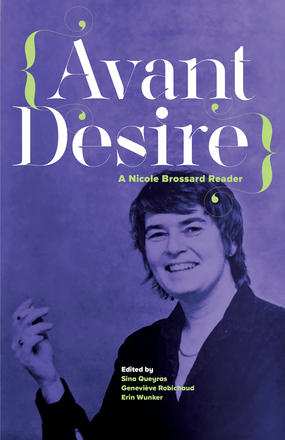
The definitive survey of an essential feminist poet.
In June 2019, Nicole Brossard was awarded the Lifetime Recognition Award from the Griffin Poetry Trust. Rarely has a prize been so richly deserved. For five decades she has been writing ground-breaking poetry, fiction, and criticism in French that has always been steadfastly and unashamedly feminist and lesbian.
Avant Desire moves through Brossard’s body of work with a playful attentiveness to its ongoing lines of inquiry. Like her work, this reader moves beyond conventional textual material to include ephemera, interviews, marginalia, lectures, and more. Just as Brossard foregrounds collaboration, this book includes new translations alongside canonical ones and intertextual and responsive work from a variety of artist translators at various stages of their careers.
Through their selections, the editors trace Brossard’s fusion of lesbian feminist desire with innovation, experimentation, and activism, emphasizing the more overtly political nature of her early work and its transition into performative thinking.
Devotees of Brossard will be invigorated by the range of previously unavailable materials included here, while new readings will find a thread of inquiry that is more than a mere introduction to her complex body of work. Avant Desire situates Brossard’s thinking across her oeuvre as that of a writer whose sights are always cast toward the horizon.
Reviews
(On Notebook of Roses and Civilization ) [L]yrical descriptions of lesbian desire coupled with a continued meditation on language. Brossard conflates writing with lovemaking [. .. ] the poems forming a grammar of desire, like a diagrammed body.
[T]he nearly hundred poems in Ardour appear as fragments, but their brevity belies their breadth. [. .. ] I feel saved by their intimacy, partly owing to their diminutive size: they feel like whispered truths, or at least consolations.
(On Baroque at Dawn) The book is studded with long poetic riffs that cry out, even in translation, to be heard. Brossard is the master of the headlong, breathless, involving description. [. .. ] It is an arresting beginning that showcases the talent that won Brossard a Governor General's Award for her poetry, as well as Quebec's Prix Athanse-David for the whole of her work.
(On Selections) [A] text lush with sensuality and sharp angles, precise and lacking fear. Even through translation it's impossible to fail to notice Brossard's control of words: the way they hold together with obvious strength yet create delicate movements as well.
(On Fences in Breathing) The voices of fiction and truth bleed in and out of each other; relationships ebb and sharpen; portraits are etched and blurred; the summer gives way to autumn and steel" in one breath. [. .. ] The atmosphere of reverie that mesmerizes the novel's characters and sends them careening into other selves also overcomes the reader - we are taken by the slow eroticism of great masses of language and meaning moving into each other, by the precisionof "the dry sound of the piano cover being lifted," the lyricism that Brossard nimbly doles out [. .. ] The English version is suggestive without being overt, and playful without seeming clever; it's the perfect translation of an elegant, complicated book.
Her language moves between sensuality and deconstructionism in a luscious interplay between the abstract and the corporeal. [. .. ] The new translations in Selections are a provocative delight.
(On Fences in Breathing) The language with which their stories are built conceals as much as it betrays, not only about the characters but also about the writer-narrator. Full of tantalizing loose ends and teasing suggestions, this novel invites the reader into a psychological landscape as complex and remote as the chateau in which the action takes place.
(On Notebook of Roses and Civilization) Nicole Brossard is a national treasure, and we don't need the Molson Prize and her two Governor General's Literary Awards to remind us of that. [. .. ] Brossard summons up the sorts of words that drive and haunt us: names of places and people, of cherished objects, words of pleasure and pain, words that "shoot up before our very eyes like cloned shadows replete with light and great myths. " The word is entangled with civilization and its discontents, but also preserves and exalts the realm of the rose.
(On Intimate Journal) [A] a gorgeous, organically coherent and fully formed meditation on the nature of biography, self-reflection, anger, art, friendship and lesbian life. [. .. ] This prose is so eloquent, so precise, you feel privileged to be allowed inside her head. I just wish the book were longer.
Nicole Brossard's White Piano dwells along a series of temporal and physical borderlines: between the apocalyptic panic of the future and the archival pleasure of the past, between the body's politics of touch and language's typological risks, and between concrete detail and totalizing abstraction. [. .. ] Brossard works in a space defined by both a worry about the potential violence carried in the body and language and an understanding of the need forstory.
"